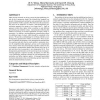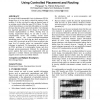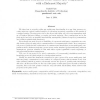36 search results - page 3 / 8 » Security Preserving Amplification of Hardness |
121
click to vote
WPES
2003
ACM
15 years 6 months ago
2003
ACM
Privacy is becoming an increasingly important issue in many data mining applications, particularly in the security and defense area. This has triggered the development of many pri...
133
click to vote
SIGMOD
2010
ACM
15 years 1 months ago
2010
ACM
Most previous research on privacy-preserving data publishing, based on the k-anonymity model, has followed the simplistic approach of homogeneously giving the same generalized val...
104
Voted
CODES
2007
IEEE
15 years 7 months ago
2007
IEEE
In current Field-Programmable-Logic Architecture (FPGA) design flows, it is very hard to control the routing of submodules. It is thus very hard to make an identical copy of an ex...
111
Voted
P2P
2008
IEEE
15 years 7 months ago
2008
IEEE
We propose an efficient framework for enabling secure multi-party numerical computations in a Peer-to-Peer network. This problem arises in a range of applications such as collabo...
106
Voted
STOC
2004
ACM
16 years 1 months ago
2004
ACM
We show how to securely realize any multi-party functionality in a way that preserves security under an a-priori bounded number of concurrent executions, regardless of the number ...



